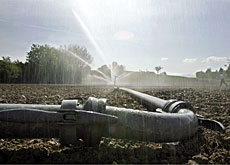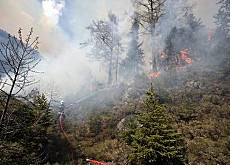Dry weather fires up irrigation debate

A long spell of dry weather in Switzerland has forced farmers to start irrigating their fields earlier than usual - a decision that has angered environmentalists.
With no end in sight to the unusually warm weather, farmers fear that this year will be a repeat of 2003’s drought, which cost them around SFr400 million ($330 million).
The government’s Agroscope agriculture research station has warned that if no rain comes in the next two weeks the situation will become critical.
It has advised farmers to start irrigation to avoid crop loss and ensure that land quality is preserved.
The government has offered funding for agricultural sprinkler systems to the whole of Switzerland since 2002. These subsidies, worth millions of francs, have mostly benefited fruit and vegetable farmers.
Irrigation systems have become more popular since 2003’s heatwave. But environmental and conservation organisations have raised concerns about the practice.
They claim that irrigation is affecting the already low water levels in rivers and streams.
Pro Natura, the country’s leading conservation agency, says the policy of subsidising these systems nationwide is not a real solution to the problem.
Short-term solution
“We need to find long-term solutions as periods of drought will become more frequent,” spokesman Roland Schuler told swissinfo.
“Large scale irrigation from Geneva [in the west] to St Gallen [in the east] is a short-term solution and does not deal with the problem.”
Schuler admits, however, that long-term solutions are harder to find.
“When it comes to crop rotation we have to increasingly take into account the scarcity of water,” he said.
Jürg Fuhrer of the Agroscope research station said subsidies should only be given for high value crops, such as vegetables.
“We must consider all options for reducing the water consumption in agriculture, including technical means,” Fuhrer told swissinfo.
Schuler said the advice given to farmers to irrigate their fields only made sense as a short-term emergency strategy.
“These short-term measures should not used to increase yields in the long-term,” he said.
Water level concerns
Schuler warned that taking water from lakes, rivers and canals – and reducing the water levels – could lead to the remaining water heating up.
“This will have an immediate negative effect on fish and other living organisms,” Schuler said.
But Andreas Schild, from the Federal Agriculture Office, told swissinfo that farmers did not use small rivers or streams to irrigate their fields.
“There is the 1991 water protection law in this respect,” he pointed out. Cantons ensure that the law is upheld.
But environment groups are sceptical, saying that total control of farmers’ activities was not possible. Even minor water sources are tapped by farmers for irrigation, they maintain.
swissinfo, based on a German article by Jean-Michel Berthoud
Drought is set to become an issue in agriculture owing to climate change.
Findings from the Agroscope Reckenholz-Tänikon Research Station support the idea that there will be an increased frequency of drought over the next 30-50 years. Until now there has been a period of drought every 5 years, in the future this could be every 2-3 years.
The research station says that farmers will have to adapt to new climate conditions while facing an uncertain water supply.
The River Po in Italy – the country’s longest river – is already 6 metres under its normal water level.
Experts are concerned that the drought could be worse than the one in 2003. If there is no rain soon, they predict that crops will be affected. One third of Italy’s agricultural production comes from the Po area. Wildlife is also suffering.
Austria is also heading for record drought if there is no rainfall. In many regions it has not rained for weeks. Germany is similarly affected.
Weather experts say that April is set to be the eighth month in a row to have been unusually warm.

In compliance with the JTI standards
More: SWI swissinfo.ch certified by the Journalism Trust Initiative

You can find an overview of ongoing debates with our journalists here. Please join us!
If you want to start a conversation about a topic raised in this article or want to report factual errors, email us at english@swissinfo.ch.